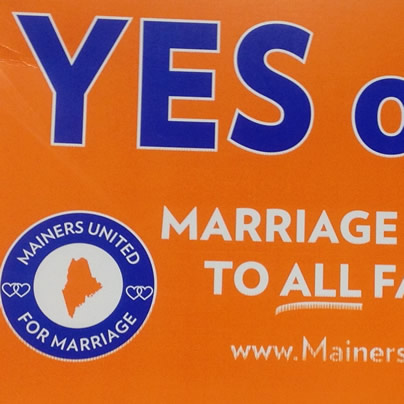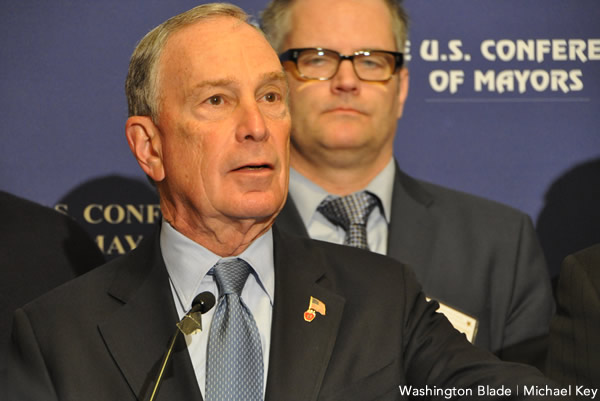National
State marriage campaigns make final election push
Voters in Maine, Md., Minn. and Washington to consider measures next week


A Mainers United for Marriage volunteer speaks with a likely voter (Photo courtesy of Mainers United for Marriage)
With less than a week before Election Day, the four statewide same-sex marriage campaigns remain optimistic voters will support ballot measures that will allow gay men and lesbians to tie the knot.
“We feel as confident as I’ve ever felt going into a campaign,” said Matt McTighe, campaign director of Mainers United for Marriage.
State campaign finance reports indicate Mainers United for Marriage has raised nearly four times as much money as Protect Marriage Maine, but the anti-Question 1 group continues to air television ads across the state that same-sex marriage supporters maintain mislead voters.
Protect Marriage Maine’s latest television ad features David and Tania Parker who unsuccessfully sued their son’s suburban Boston school after he brought home a book that features two men who get married. The Maryland Marriage Alliance, the group that prompted a Nov. 6 referendum on the Free State’s same-sex marriage law Gov. Martin O’Malley signed this year, earlier this month debuted a similar ad that features the Lexington, Mass., couple.
“What we do in a school is no substitute for what happens at home. That’s where family values come in — that’s where core values come in,” said teacher Amy Boungard who appears in a Mainers United for Marriage ad that counters the Protect Marriage Maine spot that features the Parkers. “No law is going to change the core values we teach here at home.”
A number of politicians, celebrities and other high-profile figures have either backed same-sex marriage referenda in Maine, Minnesota and Washington or opposed a proposed state constitutional amendment that would ban nuptials for gays and lesbians in Minnesota.
New York City Mayor Michael Bloomberg earlier this month donated $500,000 to the Maine, Minnesota and Washington same-sex marriage campaigns. The Johns Hopkins University graduate on Oct. 12 gave $250,000 to Marylanders for Marriage Equality, the group defending Question 6.
Actor Brad Pitt on Wednesday announced he will donate $100,000 to the Human Rights Campaign’s National Marriage Fund that supports the four statewide campaigns — HRC will have invested $5 million in these ballot measures by Election Day. Bill and Melinda Gates on Oct. 23 made a $500,000 donation to Washington United for Marriage, the group supporting the referendum on the state’s same-sex marriage law Gov. Chris Gregoire signed in February.
“These amazing gifts, from two visionary leaders, demonstrate their confidence in our campaign, which families across Washington State are counting on us to win,” said Zach Silk, campaign manager for Washington United for Marriage, who also applauded Bloomberg. “They join tens of thousands of individual donors and their call to action, coming as it does in these final days, is an inspiration to every supporter of the freedom to marry.”
Vikings punter Chris Kluwe joined U.S. Sens. Amy Klobuchar and Al Franken and hundreds of others at a Minneapolis rally on Oct. 29 against Minnesota’s proposed ban on marriage for same-sex couples.
Minnesotans United for All Families reported on Oct. 30 it has raised more than $3 million in cash and in-kind contributions since September.
A Star-Tribune Minnesota Poll published on Oct. 28 found 48 percent of likely voters support the proposed amendment, compared to 47 percent who oppose it. Richard Carlbom, campaign manager for Minnesotans United for All Marriage, conceded to the Washington Blade he expects the election results to be close. He stressed, however, he remains confident state voters will reject the proposed amendment.
“It’s an incredible force right now and we’re really proud of Minnesota standing up and uniting behind this idea that we can fight back this amendment,” he said, referring to the group’s latest campaign finance report that indicates 63,000 people have contributed to Minnesotans United for All Families. Carlbom said the campaign also has 10,000 volunteers who will work with potential voters in the days leading up to Election Day. “We know every vote will count.”
McTighe was quick to point out he does not want to become overconfident going into Election Day. He remains cautiously optimistic, however, about his group’s prospects in Maine and other same-sex marriage campaigns across the country.
“We’ve never won one of these ballot measures,” said McTighe. “I feel as good as I can possibly feel.”
Federal Government
UPenn erases Lia Thomas’s records as part of settlement with White House
University agreed to ban trans women from women’s sports teams

In a settlement with the Trump-Vance administration announced on Tuesday, the University of Pennsylvania will ban transgender athletes from competing and erase swimming records set by transgender former student Lia Thomas.
The U.S. Department of Education’s Office for Civil Rights found the university in violation of Title IX, the federal rights law barring sex based discrimination in educational institutions, by “permitting males to compete in women’s intercollegiate athletics and to occupy women-only intimate facilities.”
The statement issued by University of Pennsylvania President J. Larry Jameson highlighted how the law’s interpretation was changed substantially under President Donald Trump’s second term.
“The Department of Education OCR investigated the participation of one transgender athlete on the women’s swimming team three years ago, during the 2021-2022 swim season,” he wrote. “At that time, Penn was in compliance with NCAA eligibility rules and Title IX as then interpreted.”
Jameson continued, “Penn has always followed — and continues to follow — Title IX and the applicable policy of the NCAA regarding transgender athletes. NCAA eligibility rules changed in February 2025 with Executive Orders 14168 and 14201 and Penn will continue to adhere to these new rules.”
Writing that “we acknowledge that some student-athletes were disadvantaged by these rules” in place while Thomas was allowed to compete, the university president added, “We recognize this and will apologize to those who experienced a competitive disadvantage or experienced anxiety because of the policies in effect at the time.”
“Today’s resolution agreement with UPenn is yet another example of the Trump effect in action,” Education Secretary Linda McMahon said in a statement. “Thanks to the leadership of President Trump, UPenn has agreed both to apologize for its past Title IX violations and to ensure that women’s sports are protected at the university for future generations of female athletes.”
Under former President Joe Biden, the department’s Office of Civil Rights sought to protect against anti-LGBTQ discrimination in education, bringing investigations and enforcement actions in cases where school officials might, for example, require trans students to use restrooms and facilities consistent with their birth sex or fail to respond to peer harassment over their gender identity.
Much of the legal reasoning behind the Biden-Harris administration’s positions extended from the 2020 U.S. Supreme Court case Bostock v. Clayton County, which found that sex-based discrimination includes that which is based on sexual orientation or gender identity under Title VII rules covering employment practices.
The Trump-Vance administration last week put the state of California on notice that its trans athlete policies were, or once were, in violation of Title IX, which comes amid the ongoing battle with Maine over the same issue.
New York
Two teens shot steps from Stonewall Inn after NYC Pride parade
One of the victims remains in critical condition

On Sunday night, following the annual NYC Pride March, two girls were shot in Sheridan Square, feet away from the historic Stonewall Inn.
According to an NYPD report, the two girls, aged 16 and 17, were shot around 10:15 p.m. as Pride festivities began to wind down. The 16-year-old was struck in the head and, according to police sources, is said to be in critical condition, while the 17-year-old was said to be in stable condition.
The Washington Blade confirmed with the NYPD the details from the police reports and learned no arrests had been made as of noon Monday.
The shooting took place in the Greenwich Village neighborhood of Manhattan, mere feet away from the most famous gay bar in the city — if not the world — the Stonewall Inn. Earlier that day, hundreds of thousands of people marched down Christopher Street to celebrate 55 years of LGBTQ people standing up for their rights.
In June 1969, after police raided the Stonewall Inn, members of the LGBTQ community pushed back, sparking what became known as the Stonewall riots. Over the course of two days, LGBTQ New Yorkers protested the discriminatory policing of queer spaces across the city and mobilized to speak out — and throw bottles if need be — at officers attempting to suppress their existence.
The following year, LGBTQ people returned to the Stonewall Inn and marched through the same streets where queer New Yorkers had been arrested, marking the first “Gay Pride March” in history and declaring that LGBTQ people were not going anywhere.
New York State Assemblywoman Deborah Glick, whose district includes Greenwich Village, took to social media to comment on the shooting.
“After decades of peaceful Pride celebrations — this year gun fire and two people shot near the Stonewall Inn is a reminder that gun violence is everywhere,” the lesbian lawmaker said on X. “Guns are a problem despite the NRA BS.”
New York
Zohran Mamdani participates in NYC Pride parade
Mayoral candidate has detailed LGBTQ rights platform

Zohran Mamdani, the candidate for mayor of New York City who pulled a surprise victory in the primary contest last week, walked in the city’s Pride parade on Sunday.
The Democratic Socialist and New York State Assembly member published photos on social media with New York Attorney General Letitia James, telling followers it was “a joy to march in NYC Pride with the people’s champ” and to “see so many friends on this gorgeous day.”
“Happy Pride NYC,” he wrote, adding a rainbow emoji.
Mamdani’s platform includes a detailed plan for LGBTQ people who “across the United States are facing an increasingly hostile political environment.”
His campaign website explains: “New York City must be a refuge for LGBTQIA+ people, but private institutions in our own city have already started capitulating to Trump’s assault on trans rights.
“Meanwhile, the cost of living crisis confronting working class people across the city hits the LGBTQIA+ community particularly hard, with higher rates of unemployment and homelessness than the rest of the city.”
“The Mamdani administration will protect LGBTQIA+ New Yorkers by expanding and protecting gender-affirming care citywide, making NYC an LGBTQIA+ sanctuary city, and creating the Office of LGBTQIA+ Affairs.”
-

 U.S. Supreme Court5 days ago
U.S. Supreme Court5 days agoSupreme Court upholds ACA rule that makes PrEP, other preventative care free
-

 U.S. Supreme Court5 days ago
U.S. Supreme Court5 days agoSupreme Court rules parents must have option to opt children out of LGBTQ-specific lessons
-

 District of Columbia5 days ago
District of Columbia5 days agoActivists protest outside Hungarian Embassy in DC
-

 Virginia4 days ago
Virginia4 days agoSpanberger touts equality, reproductive rights in Arlington












